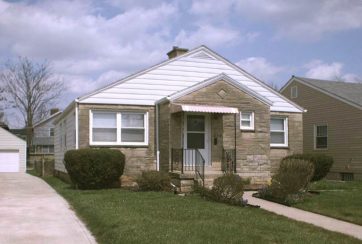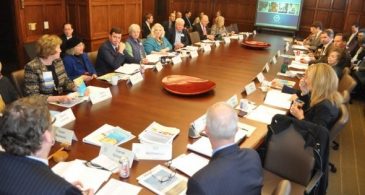Assisted Living Through a Customer’s Eyes
November 5, 2019
By Dr. Steven Fuller
They Just Don’t get It.
This is my home.

This is where I’ve lived most of my adult life. I can eat when I want to, sleep when I want to, watch TV when I want to, talk on the telephone when I want to, wear what I want to. It’s my routine, and I don’t need permission or to fill out any forms when I want to change it. I just do it. And I have privacy which I cherish. When people visit me, they just come to the front door and knock, and I let them in. Even though I can still afford living here, it’s getting tougher, because I’m starting to need help taking care of myself.
This is a facility.

This is NOT my home and doesn’t look like any home I’ve ever lived in. But this is where I was told I should go, so I did. Behind many of the windows you see is a 750 sq ft little apartment, and one of them is my mine. It’s supposed to take the place of my 2000 sq ft real home that sits on a ¼ acre of land where I have a garden and enjoy feeding the wild birds that have become friends. But facilities like this are a poor substitute.
My new routine? Looks nothing like my old routine—the routine I lived most of my life. I’ve lost control. Most of my care is now scripted and ‘synchronized.’ Meals at certain times, and if I miss my time, I miss my meal. Snacks at certain times, activities (most of which I’ve never done and don’t care about) at certain times, my medicines delivered by someone I don’t know at certain times which are different than the times I took them at home. And transportation to various places only at certain times and on certain days and with a lot of other people riding along who are going to different places than I am going, so it takes a lot longer for me to run my errands.
They say I won’t be lonely anymore because there will always be nice people around. Well, that may be true for the most part, but nice people can make me even more lonely. What I’ve experienced here is one broken or fractured relationship after another. Employee turnover is so high, that as soon as I get comfortable with one of the countless caregivers, she either gets fired, or is replaced, or is reassigned elsewhere, or doesn’t have the time any longer to have even a short conversation with me.
And just because a bunch of elderly people are all living in one facility doesn’t mean we are automatically friends. There are a lot of residents here that I don’t care to be friends with. It’s not that they’re bad people—it’s just that we’re different from each other. And forcing us to be in the same room together or at the same dinner table together doesn’t make us friends. They’re fine people, but we’re just different, and I wouldn’t choose to be their friends if I still lived in my home.
And my privacy? Gone, and never to return! All my secrets are now in plain sight. Every facet of my life is documented in some record somewhere—everything about my mental health, my physical health, my emotional health, all my likes and dislikes, my food preferences, everything about my social life, everything about my finances, everything about my family and all of our private struggles and problems. There are now literally hundreds, if not thousands, of people I will never ever meet who, with the right username and password, and a few clicks of a mouse, can learn about all my intimate personal and family secrets. I feel so invaded, but I have no choice.
Everything I do now is measured, too. It feels sometimes like I’m just a number. I don’t even have any privacy in my own apartment (which I had thought would be my last bastion of privacy). Caregivers, housekeepers, and others constantly enter and leave again whether I like it or not. Strangers somewhere are continuously tracking my every move, no matter how personal it may be—how many times I use the toilet and at what times and for how long, which room I’m in, what I eat and how much I eat, when I take (or don’t take) my medicines, how many times I leave my room, what time I leave and return. And when I leave my room to venture out into the facility, they continue to monitor every move I make—there’s a camera everywhere, and I have to wear some watch or pendant so that they know exactly where I am and how long I’ve spent in any single location. Then they collect all this information about me and share it with other people who then use it in ways I’ll never understand.
My friends I had when I lived at home don’t visit me much anymore. When I lived at home, they just parked in my driveway and came in through the front door. Now, just to visit, they must park in a parking lot that is a long walk to the front door of the facility, especially in bad weather. Then, they are scrutinized and must sign in and sign out and indicate whom they are visiting. They can only visit at certain times of the day, because the facility doors are locked at certain hours. And every move they take is being secretly monitored and recorded, so that we know that people somewhere are watching us during our visit.
So, what about the reason for my coming to the facility—needing help with my healthcare? Well, my family and I learned very quickly that it all has a price. And we also learned that the care I have available to me is in direct proportion to the profitability I contribute to another bunch of people I will never meet:
The board—these people:

These are the executives who are the owners and operators of my facility. They are certified public accountants, bankers, lawyers, business executives, hospitality professionals. But not one single doctor. Not one! My only reason for so reluctantly coming to this facility is because I need help with my healthcare, but there’s not one doctor who’s helping to lead my healthcare! The weird reality is that a certified public accountant somewhere has more influence over my healthcare at this facility than my doctor!
And these folks all answer to investors who will never meet me. But the decisions these investors make about me, even though they affect my daily life, are based only on financial spreadsheets.
I ask you…”What happened to ME in all this process?” I have been completely lost in a morass of REITS and Wall Street and business executives.
There’s so much more to say. But in the quiet moments, when I think about my home, my real home before I came to this facility, and why I didn’t come to this facility when I was younger and ‘healthier,’ I just shake my head and think: “They just don’t get it.”
And they probably never will…
CREDIT: Dr. Steven Fuller is a triple board-certified physician/entrepreneur who develops programs in support of an Integrated Care model of senior housing. This model includes 3 equal, interactive, and mutually supportive team members: real estate, hospitality, and healthcare. He is president of Illumination Analytics and a Six Sigma Green Belt.